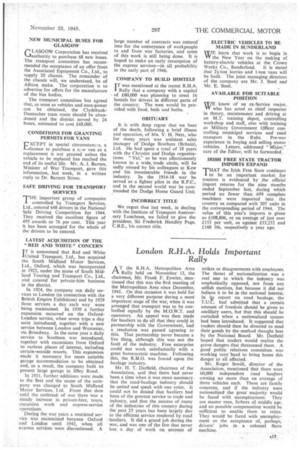London R.H.A. Holds Important Rally
Page 19

If you've noticed an error in this article please click here to report it so we can fix it.
AT the R.H.A. Metropolitan Area Rally held on November 13, the chairman, Mr. Frank F. Fowler, mentioned that this was the first meeting of the Metropolitan Area since December, 1941. On that occasion it was held for a very different purpose during a most important stage of the war, when it was arranged that transport was to be conirolled equally by the M.O.W.T. and operators. An appeal was then made for hauliers to do all that they could in partnership with the Government, and a resolution was passed agreeing to this. That partnership never became a live thing, although this was not the fault of the industry. Free enterprise could not work satisfactorily with a great bureaucratic machine. Following this, the R.14.0. was forced upon the haulage industry.
Mr. H. T. Dutfield, chairman of the Association, said that there had never been a time when it was more necessary that the road-haulage industry should be united and speak with one voice. It could not be denied that hauliers had been of the greatest service to trade and industry, and that the success of many of the industries of this country during the past 25 years has been largely due to the efficient service rendered by road -hauliers. It did a grand job during the war, and was one of the few that never lost a day of work on account of
strikes or disagreements with employees. The threat of nationalization was a real one to which the industry was emphatically opposed, not from any selfish motives, but because it did not believe it to be in the national interest. In it.s report on road haulage, the T.U.C. had admitted that a certain amount of freedom should be given to ancillary users, but that this should be curtailed when a nationalized system had been introduced. It suggested that traders should then be directed to send their goods by the method thought best by the National Board. Mr. Dutfield hoped that traders would realize the grave dangers that threatened them. A good public relations committee. was working very hard to bring home this danger to all affected.
Mr. Roger Sewill, director of the Association, mentioned that there were 60.000 independent road hauliers owning no more than an average of three vehicles each. These are family concerns, and if the industry were nationalized the great majority would be faced with unemployment. They are master men, fathers of middle age, and no possible compensation would be sufficient to enable them to retire. They would be faced with unemployment or the acceptance of, perhaps, drivers' jobs in a colossal State machine.




















































